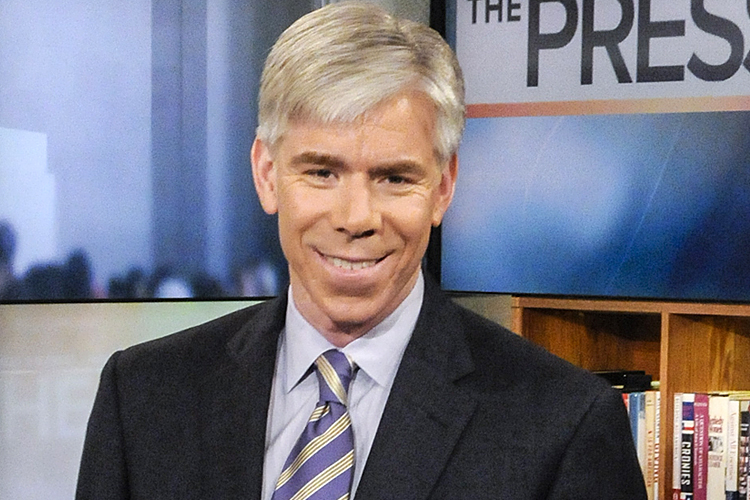It feels like we go through this same routine every few months or so. “Meet the Press” reaches some new low point for ratings, and chatter starts building about how time is running out for host David Gregory. The newest round of speculation comes courtesy of the New York Post and Page Six, which cites “an NBC source” in reporting that Gregory will be given the boot after the midterm elections. NBC, of course, denies all this as mere rumor-mongering and says that they’re sticking with Gregory.
The network’s commitment to Gregory as host of “Meet the Press” is a bit confounding, given that during his tenure the show has collapsed in viewership and has become basically unwatchable. NBC would be completely justified in giving him the boot. And after it does that, it should take the next logical step and just cancel “Meet the Press.”
Forget about a new host, forget about juggling the format, forget about more celebrity guest panelists. They should burn it down from top to bottom.
The problem with “Meet the Press” is that it’s too much of an icon of insider D.C. culture. Its role as a public affairs program has been usurped by a small army of vacant pundits who serve up shallow, predictable opinions that never stray too far from accepted conventional wisdom. And it’s always the same rotating cast of talking heads. Since the beginning of 2013, Newt Gingrich has appeared five times on the program. Rudy Giuliani has made four appearances. Harold Ford Jr. has been on seven times. Nobody gives a thin damn what these people have to say. The past few months have seen Gregory host both Tony Blair and Paul Wolfowitz to discuss violence in Iraq and how the U.S. should fight terrorism. It’s almost as if he’s inviting you not to take him seriously.
Essentially, the show has become a playground for people whose primary calling in life is to be around people in power. And when you look at the names most often mentioned as replacements for Gregory, you don’t see much hope of this dynamic changing. Chuck Todd, who is considered the front-runner for the gig owing to his reputation as a “political junkie,” is as much a devotee of Beltway insiderism as Gregory, and exhibits the sort of forced-centrist behavior that serious pundits believe insulates them from accusations of bias.
The other names that frequently get tossed around? “Morning Joe” hosts Mika Brzezinski and Joe Scarborough, who basically already host their own version of David Gregory’s “Meet the Press” – unwatchable, power-worshiping, dripping with elite condescension, and weirdly tolerant of Harold Ford.
This is a problem facing all the Sunday shows: They’ve become basically indistinguishable from each other, and they’re all fighting for the same dwindling segment of the population that still cares to spend their weekend mornings watching a bunch of (mostly male and white) establishment figures politely argue about politics. Each one is an hour-long exercise in confirmation bias for wealthy old people who want their opinions mouthed back at them by other wealthy old people.
“Meet the Press” under Gregory has tried to shake things up a bit while still hewing to the same tired format, and it’s been a disaster. The average show can feature as many as eight or 10 guests and segments that shift rapidly from one topic to the next without ever pausing to really engage with any of them. The Washington Post’s Paul Farhi described a prototypical show this past April, during the last round of speculation surrounding Gregory’s future:
After opening with Gregory’s taped interview with Ukrainian Prime Minister Arseniy Yatsenyuk, the host moved swiftly to live dual-screen chats with Senate Foreign Relations Committee members Bob Corker (R-Tenn.) and Chris Murphy (D-Conn.). Then it was on to the journalists’ roundtable discussion, followed by an interview with Democratic National Committee chair Rep. Debbie Wasserman Schultz (D-Fla.) about health care and the midterm elections.
Then, still more segments: A new recorded feature called “Meeting America” in which reporter Kevin Tibbles looks at something happening outside Washington (in this case, a debate in Kentucky over the building of a Biblical theme park using tax subsidies); more roundtable discussion; and a photos-of-the-week feature called “Images to Remember.” The program closed with a short interview with New York Times reporter Jo Becker about her new book about gay marriage, “Forcing the Spring.”
A program that frenetic virtually guarantees that nothing interesting will happen. “More interviews, more voices, does not automatically lead to more ‘interesting’ content,” Dave Weigel wrote back in May. “It leads to more content in less time—and less exploration of each subject covered. It robs the Sunday shows of their old advantage, their ability to lock subjects in a well-lit room for most of an hour and boil away their talking points.”
It might be time to realize that there’s no fixing the Sunday shows because they can’t be fixed. Their audiences will continue to disappear, and their influence will continue to wane regardless of which Beltway journalist is elevated to the host’s chair. NBC will ride out “Meet the Press” for as long as it’s profitable, but they’re just prolonging the sad, slow decline.

